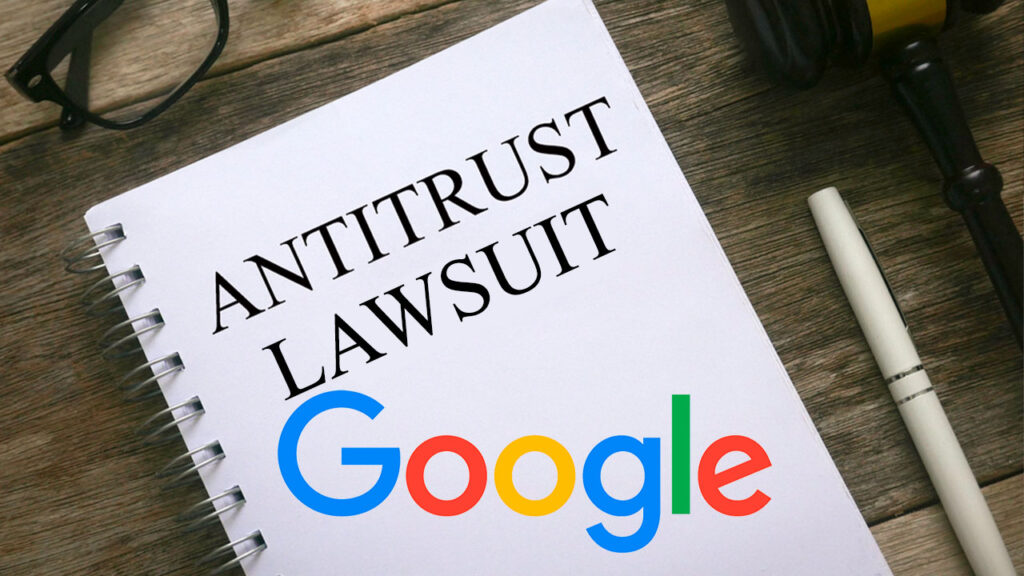Top 10 SEO Trends in 2025: Stay Ahead in Digital Marketing
Brett Lewis
SEO - January 31, 2025

Curious about SEO trends in 2025? This article uncovers the key developments shaping the future of SEO. Learn about emerging technologies, evolving search practices, and strategies you need to adopt to stay ahead.
Key Takeaways
- Google’s antitrust trial is expected to diversify the SEO landscape, prompting practitioners to optimize for multiple search engines beyond Google.
- AI tools are revolutionizing SEO by enhancing content creation, optimizing on-page elements, and predicting shifts in user behavior, emphasizing the need for a balance with human creativity.
- Understanding user intent will be crucial for effective SEO strategies in 2025, requiring tailored content that aligns with users’ motivations and improving engagement metrics.
Google’s Antitrust Trial and Its Impact on SEO

The antitrust ruling against Google is poised to be a game-changer in the world of search engine optimization. With the potential increase in competition, Microsoft’s Bing and other search engines may gain a larger market share, leading to a more diversified SEO landscape. This shift could require SEO practitioners to rethink their strategies and optimize for multiple search engines rather than focusing solely on Google.
Experts anticipate that changes in user choices for default search engines could reshape market dynamics and impact SEO strategies. If Google is required to alter its business practices, we might see new advertising platforms emerging. This diversification could lead to a broader range of SEO tools and techniques being developed, providing more opportunities for businesses to enhance their online visibility through Google Search Console.
However, the potential manipulation of search engine algorithms presents a risk of easier rankings with low-quality content. SEO practitioners must stay vigilant and adhere to best practices to ensure that their content remains high-quality and relevant. The dramatic changes expected in the SEO landscape due to these antitrust rulings will undoubtedly lead to diversification and multiple strategies to navigate the new terrain, including various ranking factors.
AI Tools Revolutionizing SEO

The integration of AI tools into SEO practices is transforming the digital marketing landscape. AI-powered content generation tools streamline the creation of SEO-friendly content, saving time and enhancing quality. These tools can analyze large volumes of data quickly, providing insights into user behavior and search trends that would be impossible to gather manually.
AI also plays a crucial role in on-page optimization, helping identify relevant keywords and improve content readability. By automating tasks such as SERP analysis, keyword research, and content optimization, AI tools enhance productivity and ensure high-quality content creation. However, it’s essential to balance AI-generated content with human creativity to maintain originality and a personal touch.
One of the most significant advantages of AI in SEO is its predictive capabilities. AI algorithms can predict changes in user behavior and search engine algorithms, allowing marketers to adapt their strategies proactively. Additionally, AI can analyze competitors’ link-building strategies, helping develop more effective backlinking approaches.
While AI tools are revolutionizing SEO, human expertise remains crucial in ensuring quality and adding unique insights that AI might miss. The rise of AI in SEO is undoubtedly one of the most important SEO trends for 2025. As AI continues to evolve, SEO practitioners must leverage these tools to stay competitive while maintaining a balance between automation and human creativity.
E-E-A-T: Elevating Content Credibility
E-E-A-T, which stands for Expertise, Authoritativeness, Trustworthiness, and Experience, is becoming increasingly crucial in assessing content quality and ranking factor in search results. This framework is particularly significant for websites that impact users’ health or financial stability, emphasizing the need for credible and authoritative content.
Developing content associated with recognized authors enhances the perceived authority and trustworthiness of the material. Brands should provide sufficient digital evidence of their credibility and experience in their specific niches. Content that showcases first-hand experience is prioritized by Google’s evaluation criteria, making it essential for SEO practitioners to highlight the real human experience behind their content.
To enhance E-E-A-T, focus on creating high-quality content that is well-researched, engaging, and valuable to users. Demonstrating trustworthiness hinges on the accuracy and accessibility of the published information. Establishing author credibility through recognized expertise can significantly boost a site’s authority.
Additionally, verifiable authorship is becoming a key factor in the success of online content and SEO. The integration of experience into the E-E-A-T framework refines how Google assesses content quality. By prioritizing first-hand experience and demonstrating expertise, authoritativeness, and trustworthiness, brands can improve their visibility and ranking in search engines, ultimately leading to better SEO performance.
User Intent Over Keywords
In 2025, successful SEO strategies will hinge on understanding user search intent, which includes recognizing the specific motivations behind search queries. User intent is categorized into informational, navigational, and transactional types, each requiring tailored content strategies. By optimizing content to align with user intent, businesses can achieve higher conversion rates and better engagement metrics.
Tools like Google Keyword Planner and SEMrush can help identify keywords that reflect specific user intentions, enhancing content relevance. Long-tail keywords that reflect user intent are becoming increasingly valuable, as they typically face less competition and better match user queries. Content that addresses specific user needs effectively tends to achieve better engagement metrics, positively affecting search rankings.
Improvements in user experience, such as faster loading times and mobile responsiveness, are crucial for meeting user expectations and lowering bounce rates. User engagement metrics, such as time on page and bounce rate, are becoming crucial for evaluating content effectiveness in SEO. By adapting to user signals and behaviors, businesses can ensure their content meets the expectations of search engine algorithms.
The emphasis on user intent over keywords marks a significant shift in SEO strategies. By focusing on what users are looking for and providing relevant, high-quality content, businesses can improve their search rankings and overall online visibility.
Technical SEO Enhancements

Technical SEO enhancements play a crucial role in improving a website’s visibility in search engine results by ensuring better crawlability and indexing. Structured data markup helps search engines understand website content better, potentially leading to more appealing search result snippets. Utilizing XML sitemaps allows search engines to discover and index web pages more efficiently, ensuring comprehensive coverage of content.
Securing a website with HTTPS is essential because search engines prioritize secure sites, giving them an advantage in rankings. Optimizing page speed involves techniques such as image compression and browser caching, which can significantly enhance loading times and user experience. Robust site architecture and properly configured robots.txt files enhance navigation for users and search engines, supporting improved content discoverability. Additionally, focusing on core web vitals can further improve overall site performance.
Implementing canonical tags helps avoid duplicate content issues by indicating the preferred version of a web page. Custom handling of 404 error pages and implementing proper redirects can help maintain user engagement and mitigate negative impacts on SEO. By focusing on these technical SEO enhancements, businesses can improve their online visibility and search rankings.
The latest SEO trends for 2025 highlight the importance of technical SEO in achieving SEO success. By staying up to date with these enhancements and implementing best practices, businesses can ensure their websites are optimized for search engines and provide a seamless user experience.
The Rise of Zero-Click Searches
Zero-click searches occur when users find answers directly on the google search results page, eliminating the need to click through to websites. The growth of zero-click searches is largely due to Google’s focus on enhancing user experience by delivering quick answers. Mobile users increasingly favor instant responses, which contributes to the rise of zero-click searches.
Rich results such as featured snippets and answer boxes significantly drive the prevalence of zero-click outcomes. Businesses must adapt by creating content designed to be featured in snippets, aligning with user intent. Long-tail keywords can capture specific queries that are likely to be featured in zero-click search results. Monitoring SERP features for keywords can help businesses adjust their content strategies effectively.
Maintaining a strong brand presence can enhance credibility, even when users do not click through to a website. Businesses can optimize for featured snippets by structuring content in concise, informative formats. By adapting to the rise of zero-click searches, businesses can ensure their content remains visible and relevant in search engine results.
Voice Search Optimization
Voice search technology is rapidly growing, with sales of smart speakers projected to surpass $30 billion by 2024. By 2025, it is estimated that 75% of households will own smart speakers capable of voice search. Over half of the global population engages with voice search daily, making it a crucial aspect of SEO strategies. The use of voice assistants on smartphones is also prevalent, with 62% of American adults utilizing them.
Industries such as restaurants, grocery stores, and clothing retailers are particularly benefiting from voice searches. Key optimization practices include using natural language keywords and ensuring mobile-friendliness. Fast loading times and accurate business information across platforms are crucial for voice search optimization. Including content in voice search by utilizing natural language queries can significantly improve online visibility.
Advancements in technology and increased usage of virtual assistants have contributed to the growth of voice search. As voice search continues to rise, businesses must adapt their SEO strategies to remain competitive. By optimizing for voice search, businesses can enhance user engagement and improve their search rankings.
Visual Search Trends

Visual search is becoming increasingly important in SEO, allowing users to conduct searches using images instead of text. Tools like Google Lens are enhancing the ability to find information by analyzing images, influencing how businesses optimize their visual content. Leveraging these tools allows businesses to tap into a new dimension of search engine optimization, catering to the growing preference for visual content.
Optimizing images for visual search includes using descriptive file names and relevant alt tags to improve recognition by search engines. Captions accompanying images can enhance SEO by providing context that helps search engines understand the visual content. Focusing on these optimization strategies ensures that visual content remains easily discoverable and relevant in search engine results.
The rise of visual search trends in 2025 highlights the need for businesses to adapt their SEO strategies to include visual content. Staying up to date with these trends and implementing best practices enhances online visibility and user engagement in new and innovative ways.
Local SEO Strategies

Local SEO is crucial for boosting visibility for businesses, with 46% of Google searches indicating local intent. Mobile searches account for a substantial portion of local queries, with 76% of consumers visiting a store the same day after a local search. Optimizing a Google Business Profile is essential for ranking in local search results. Ensuring the accuracy of business information across various platforms enhances Google’s confidence in the legitimacy of a business.
Online reviews play a significant role in local SEO rankings, as they help build consumer trust. Local SEO strategies include using localized keywords and maintaining consistent NAP (Name, Address, Phone) citations. Optimizing for voice search can further enhance local SEO effectiveness, with 20% of mobile queries being voice-activated.
Concentrating on these local SEO strategies improves online visibility and attracts more local customers. The benefits of local SEO are clear, as it helps businesses connect with their target audience and drive organic traffic. Adapting to the latest local SEO trends will be essential for businesses looking to stay ahead in the competitive digital marketing landscape.
Continuous Learning and Adaptation in SEO
In the constantly evolving world of SEO, staying informed about the latest trends is essential for effective strategy development and countering common misunderstandings. Adaptability and a commitment to delivering exceptional value to users will be key differentiators for successful SEOs in 2025. The ability to pivot and apply new learnings quickly will set apart those who thrive from those who struggle.
Businesses should adopt an agile approach to keep up with changes in AI technology advancements that affect SEO. Regularly updating content is imperative to maintain SEO rankings and ensure that content remains relevant and fresh. The SEO industry is dynamic, requiring constant updates to strategies and understanding due to rapid algorithm changes.
Continuous learning and adaptation will be essential for mastering SEO in 2025. Staying up to date with the latest trends and best practices ensures that SEO strategies remain effective and competitive.
Summary
In summary, the top SEO trends for 2025 highlight the importance of staying informed and adaptable in the ever-changing digital marketing landscape. From the impact of Google’s antitrust trial to the revolutionary role of AI tools, the importance of E-E-A-T, and the emphasis on user intent, these trends will shape the future of SEO. Technical SEO enhancements, the rise of zero-click searches, voice search optimization, and visual search trends further underscore the need for businesses to stay ahead of the curve.
Local SEO strategies and continuous learning and adaptation will be crucial for achieving SEO success in 2025. By focusing on these key areas, businesses can improve their online visibility, drive organic traffic, and stay competitive in the digital marketing landscape.
Ultimately, staying ahead in SEO requires a commitment to continuous learning, adaptability, and a focus on delivering exceptional value to users. By embracing these trends and best practices, businesses can ensure their SEO efforts remain effective and successful in 2025 and beyond.
Frequently Asked Questions
Will SEO exist in 5 years?
SEO will continue to exist in five years, but it will evolve alongside changes in technology and user behavior. Adapting your strategies to keep pace with these developments is essential for maintaining visibility in search engine results.
What is the future of SEO in 2025?
The future of SEO in 2025 will heavily rely on AI integration, emphasizing content quality, user intent, and natural language understanding. To stay competitive, marketers must adapt to the evolving landscape of personalized, AI-driven search results.
How will Google’s antitrust trial impact SEO strategies?
Google’s antitrust trial could diversify SEO strategies by enhancing competition and potentially leading to new advertising platforms. As a result, businesses may need to adapt their SEO efforts to include alternative search engines and methods.
How are AI tools revolutionizing SEO?
AI tools are revolutionizing SEO by automating tasks such as content optimization and keyword research, enabling rapid data analysis for insights into user behavior and search trends. This enhances efficiency while highlighting the need for a balance between AI-generated content and human creativity to maintain originality.
What is E-E-A-T, and why is it important for SEO?
E-E-A-T, which stands for Expertise, Authoritativeness, Trustworthiness, and Experience, is vital for SEO as it evaluates content quality and its ability to rank in search results. Emphasizing high-quality, credible content with genuine human experience can significantly enhance your SEO performance.
